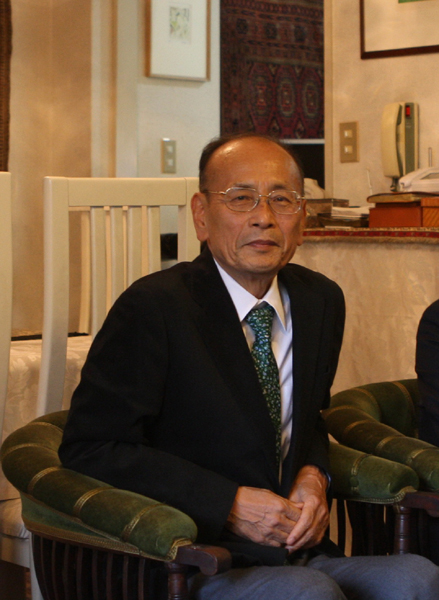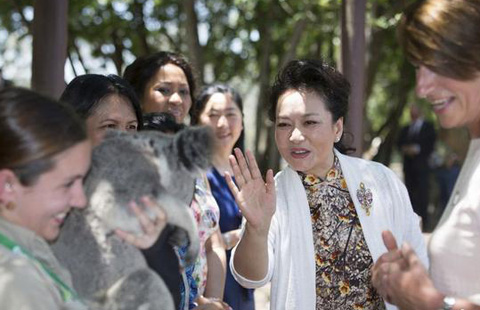Japan needs to seek reconciliation with neighbors: ex-diplomat
(Xinhua) Updated: 2015-03-16 11:36
 |
|
Ukeru Magosaki, a Japanese former senior official with the country's foreign ministry, attends an interview with Xinhua in Tokyo, March 13, 2015. [Photo/Xinhua] |
TOKYO - Japan needs to seek reconciliation with its neighboring countries through facing up to its wartime past, just like what Germany has done, a Japanese former senior official with the country's foreign ministry told Xinhua in an exclusive interview recently.
Ukeru Magosaki, who served as the head of the Intelligence and Analysis Bureau in the ministry, highly hailed German Chancellor Angela Merkel's keen urges here last week that Japan should look at its past openly and squarely, adding Japan's politicians should take the lead to correct current wrong historical perception.
The German chancellor said last Monday that Germany was reintroduced to and accepted by the international community because her country "did face its past squarely".
But Fumio Kishida, Japan's top diplomat, quibbled that the two countries can not be easily compared over the issue due to their differences.
"Both Japan and Germany brought agonies to their neighbors through aggressions and there is no difference in the nature of aggression," said Magosaki, adding Japan should learn from Germany to admit the fact and to make it a foundation of reconciliation between Japan and its neighbors.
He pointed out that some groups in Japan have tried to deteriorate the correct historical reflection. He recalled the efforts made by Japan and China in the 1970s when they were about to normalize relations, saying the efforts were similar to those Germany and France did after World War Two.
He further elaborated that rightists here, including Prime Minister Shinzo Abe, a well-known historical revisionist, are making tremendous efforts to deny or whitewash Japan's wartime crimes such as the issue of "comfort women," a euphemism for wartime sex slaves forcibly recruited by the Japanese Imperial Army, and the Nanjing Massacre.
"They attempt to deny the 'comfort women' issue by arguing whether or not the victims were forcibly recruited, but the fact is that the military truly involved in" the recruitment through coaxing and coercion, he said.
"These rightists also tried to question the exact number of the victims of the Nanjing Massacre so as to deny the war crime. But the fact is that the massacre occurred."
"Japan has a disgraceful period in history and we should look at it squarely. But Abe and some of his important political allies, such as Tomomi Inada, the policy chief of Japan's ruling Liberal Democratic Party, could not treat the wartime past properly," the veteran diplomat told Xinhua, adding he doubted if the Abe's administration would take a correct history perception in the future.
Magosaki said the history-whitewashing trend here in Japan roots in the stagnant social development which triggered strong complaints in the Japanese society and the government has done nothing to relieve the negative sentiment.
"Therefore, the easiest way to release the resentment is to attack South Korea and China and this is what is happening in Japan," said the former senior official.
On the new statement that would be issued by Abe at the 70th anniversary of the end of World War Two this summer, Magosaki said the prime minister will stress on his "active pacifist" which mainly focuses on exercising the right to collective self-defense.
"The so-called 'active pacifist' will contribute nothing to the world peace, but, will bring Japan into fatal conflicts," the former intelligence analyst said, adding that the Abe's doctrine has made Japan been targeted by terrorists, referring to two Japanese nationals were killed by Islamic State militants recently after Abe's announcement of an assistance worth about 200 million US dollars to the Mideast countries to fight against extremists.
"The 'active pacifist' will be the core of the new war anniversary statement. But Japan and the world will not benefit from the country's involvement in conflicts, especially the wars launched by the United States in Iraq and Afghanistan," Magosaki concluded.
- Japan urged to 'face history squarely'
- Top diplomats set to meet to discuss China, Japan, South Korea summit
- China, S. Korea, Japan to restore FM meeting in late March
- Japan ex-PM says Abe risks alienating neighbours if he dilutes apology
- China Voice: Japan stands at crossroads
- China urges Japan to 'make right choice' on history






